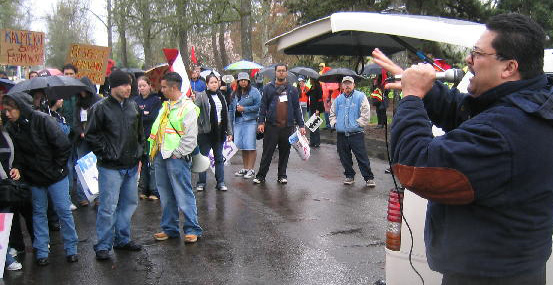
SALEM, Ore.—Oregon’s Occupational Safety and Health Administration (OROSHA) has announced the adoption of two new administrative rules on farmworker safety. The adoption of these rules comes amid concerns that the Trump administration will weaken a key Worker Protection Standard for farmworkers which was adopted in 2015, and as the state’s growers face possible losses in income due to new tariffs, global warming, and a labor shortage brought on by Trump’s immigration policies.

In an interview with People’s World, Ramon Ramirez, a farmworker leader in Oregon and a strong regional and national advocate for workers’ rights, was quick to point out that “the rule changes favor the growers rather than the people who pick the crops. We are disappointed with Oregon OSHA, and our union, Pineros y Campesinos Unidos del Noroeste (PCUN), is looking at potential legal action.”
The two changes in the rules complement one another. One “describes the Application Exclusion Zone requirements, including how employers ensure enclosed agricultural structures are closed properly, must provide instruction and information, and a decision matrix that navigates the rule requirements,” according to an OROSHA press release. In simple language, this means that the growers are supposed to ensure that outside buildings near the fields are not contaminated when pesticides are sprayed.
In labor camps in Oregon, it is common for farmworker housing to be on the edge of the crop fields, for there to be small play areas for children, and for there to be outdoor kitchens. All of these can be contaminated by spraying. Common kitchens used by farmworkers often have poor ventilation, and housing can be claustrophobic and poorly constructed.
Putting tarps over outside areas, improving ventilation, and confining farmworkers and their families to their living quarters while spraying is underway is inhumane and leaves farmworkers and their families subject to poisoning. As Ramirez said, “It’s no wonder why the life expectancy of a farmworker is 49 years of age compared to 78 years for the general population, and that farmworkers suffer 25 percent more cancer rate than the general population.”
The second OROSHA change deals with “pesticide spray drift and innovative methods” of spraying crops and “describes that if issues relating to spray drift occur, then the employer is responsible for addressing those issues, and how drift reduction technologies can be used to gain approval for innovative methods through the variance process,” says the agency’s press release.
A leading issue here is that growers have argued that pesticide drift does not occur when crops are sprayed or that the drift is minimal. However, the agency admits that “unintended ‘drift’” can create exposure to workers and their family members outside of the application area. OROSHA is trying to walk a thin line by referencing an Environmental Protection Agency rule that the Trump administration may attempt to eliminate. The rule essentially requires that a pesticide-treated area “must be free of all people other than appropriately trained and equipped pesticide handlers.”
The growers can live with OROSHA’s new rules, but they are complaining that these changes will raise production costs and make Oregon agriculture less competitive as trade wars continue. Farmworker union leaders, and particularly the activist leaders of PCUN, have pointed out on many occasions that a stronger standard is needed. They, along with food justice advocates, argue that the standard does not provide workers and their families with the maximum amount of protection after spraying and that growers should focus instead on reducing or eliminating most spraying. Farmworkers argue that many harmful chemicals are used in the fields and that many have different safe waiting times and that a maximum standard should apply.
The growers claim that the different safe waiting times for different pesticides mean that no scientific standard can apply. Farmworker and food justice advocates do not agree with OROSHA’s argument that “pesticides, although a clear necessity in many workplaces, also represent varying levels of risks to workers and others (depending on both the particular pesticide used and the circumstances of the application).” They question the necessity of pesticide use altogether and see in the “varying levels of risk” argument a long-standing excuse to ignore the health and safety of the workers and their families.
OROSHA held five hearings on these proposed rules. This writer attended two of the hearings and testified at one. Presentations from the growers were often tinged by overt racism and paternalism and often mocked science. The hearings received little publicity in mainstream media. One hearing in Woodburn, Oregon, took several hours as PCUN leaders, union members, food justice activists, and community members spoke directly to the issues involved and referenced what field work is like from both personal experience and science.
Ramirez told People’s World: “PCUN fought for over 25 years to pass the workplace safety worker protection standards of the EPA. Many Oregonians don’t realize that farmworkers and their families often live in labor camps located next to orchards or crops that are routinely sprayed with pesticides. These pesticides are neurotoxins and can cause cancer, birth defects and lifelong ailments. Labor housing is mostly rundown cabins that are substandard structures without insulation, without heating or cooling, sometimes without windows that close, and often without toilets or kitchens inside.”

PCUN is moving ahead with increased political action, helping to direct an intensive training program for young organizers and activists, supporting a radio station which gets the union’s message out to a wide area, backing a program by major retailers which certifies that food is safely produced at living wages, and protesting the Trump administration’s plans to lower labor standards.
PCUN’s efforts have helped to transform Woodburn, reform the town’s schools, and elect Rep. Teresa Alonso León to the state legislature. Alonso León is the first immigrant Latina elected as a state representative. The union is a strong voice for social justice in Oregon and has worked to win local reforms which protect immigrant workers in Oregon’s Willamette Valley.
PCUN also helped get out the vote among immigrant workers for Andrés Manuel López Obrador, Mexico’s new president-elect, in Oregon, Washington, Idaho, and Alaska. A joyous party celebrating AMLO’s victory rocked the Woodburn union hall when the election results were announced.
Reyna Lopez has recently taken over the position of Executive Director of PCUN. The selection of a woman to head a farmworker union may be historic. She brings years of political organizing and coalition-building to the job and will be leading the union as its focus shifts and new alliances are made. She is a leader in a generation of local Latinx activists who are stepping forward in immigrant rights work, labor, community struggles, and particularly important efforts to win improvements in the region’s schools.
Like free stuff? So do we. Here at People’s World, we believe strongly in the mission of keeping the labor and democratic movements informed so they are prepared for the struggle. But we need your help. While our content is free for readers (something we are proud of) it takes money — a lot of it — to produce and cover the stories you see in our pages. Only you, our readers and supporters, can keep us going. Only you can make sure we keep the news that matters free of paywalls and advertisements. If you enjoy reading People’s World and the stories we bring you, support our work by becoming a $5 monthly sustainer today.












Comments